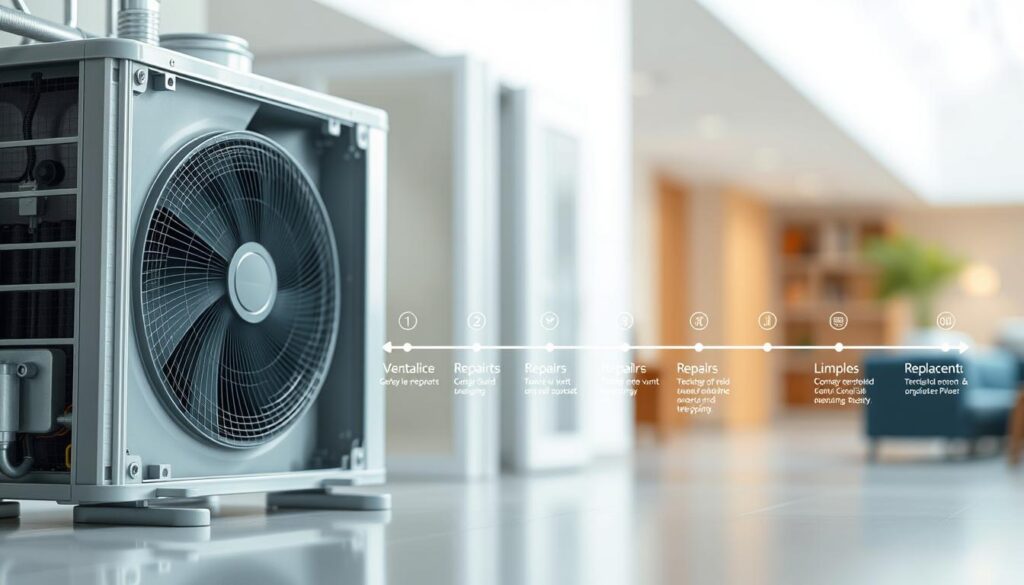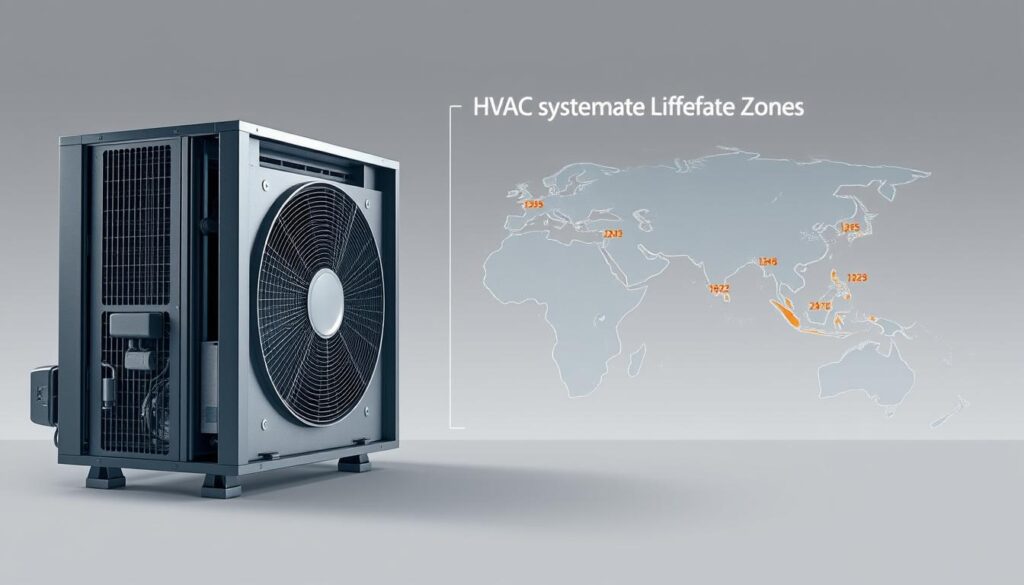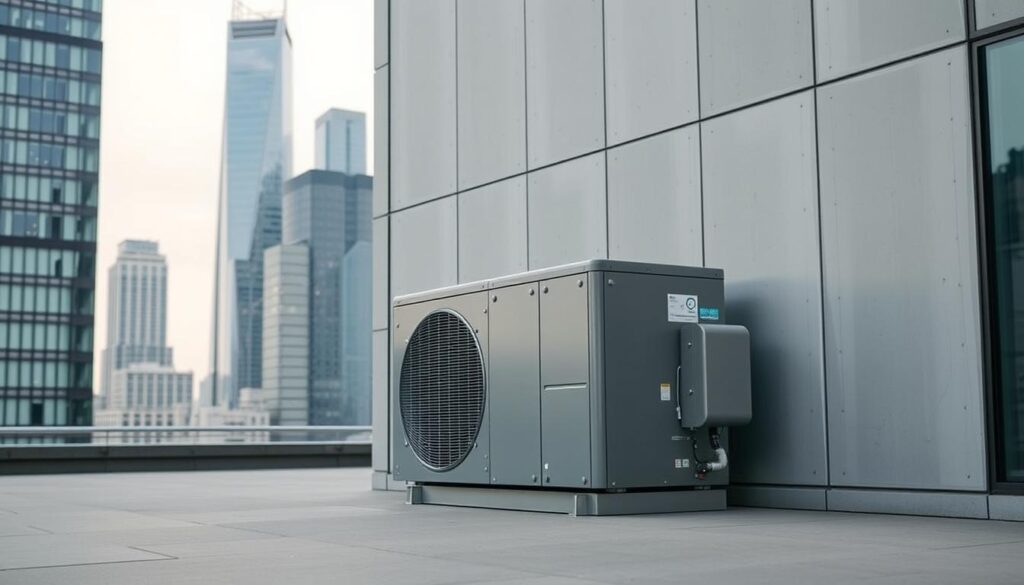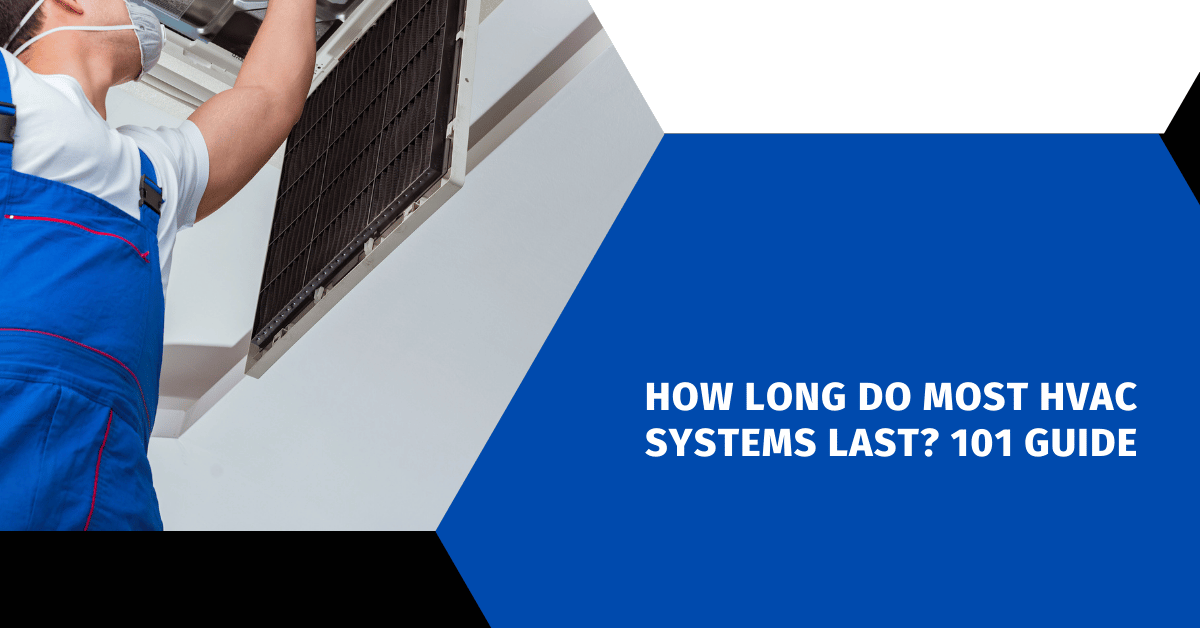Affiliate Disclosure
HVAC Guide Guys is a participant in the Amazon Services LLC Associates Program, an affiliate advertising program designed to provide a means for sites to earn advertising fees by advertising and linking to Amazon.
How Long Do Most HVAC Systems Last? Ever wondered why some HVAC systems last decades while others fail early? Knowing how long your heating and cooling system should last can save you a lot of money. Unexpected repair costs can add up quickly.

The average HVAC system lasts between 15 to 20 years. How long it lasts depends on many things. These include how well you maintain it, the quality of its installation, and the environment it’s in. Taking good care of your system can make it last longer than expected.
Each part of your HVAC system has its own lifespan. Central air conditioning units usually last 15 to 20 years. Heat pumps might last 10 to 15 years with regular care. And electric furnaces can last up to 40 or 50 years if everything goes right.
Key Takeaways
- Most HVAC systems last between 15 to 20 years
- Regular maintenance significantly extends system life
- Different HVAC components have unique longevity ranges
- Environmental factors critically impact system durability
- Professional annual service is recommended for optimal performance
Table of Contents
Understanding HVAC System Basics and Components
Your home’s comfort relies on a complex network of heating, ventilation, and air conditioning (HVAC) systems. Knowing these systems helps keep your HVAC system in top shape. It also boosts its efficiency over time.
Modern HVAC systems are complex machines. They control your home’s temperature and air quality. Each part is vital for keeping your home comfortable all year.
Key Components of Modern HVAC Systems
- Furnace: Generates heat for your home
- Air Conditioner: Removes heat and humidity
- Heat Pump: Provides both heating and cooling
- Thermostat: Controls temperature settings
- Ductwork: Distributes heated or cooled air
Types of HVAC Units
Different HVAC units suit various homes:
- Central Air Conditioning: Great for large homes with ductwork
- Ductless Mini-Split: Perfect for cooling specific areas
- Geothermal Heat Pumps: The most energy-efficient choice
- Packaged HVAC Systems: Ideal for smaller spaces
Component Roles in System Longevity
The life of your HVAC system depends on its components’ quality and upkeep. Regular checks can spot issues early. This helps keep your system running well for longer.
Choosing high-quality parts and professional installation boosts your system’s lifespan. It can also save you money on future repairs and replacements.
Explore Our HVAC Shop
Looking for top-rated HVAC tools, parts, and accessories? Visit our shop and find the perfect solution for your needs.
Visit the ShopAverage Lifespan of Different HVAC Systems
Knowing how long an HVAC system lasts is key for homeowners. It helps them plan when to replace it. The lifespan varies based on the system type and how much it’s used.
Let’s look at the average lifespans of different HVAC systems:
- Central Air Conditioning Units: 12 to 17 years
- Heat Pumps: 10 to 16 years
- Furnaces and Boilers: 15 to 20 years
- Geothermal Heat Pumps: 25 to 30 years (ground loops up to 50 years)
- Solar HVAC Systems: 25 to 30 years
- Evaporative Coolers: 5 to 15 years
The lifespan of your HVAC system depends on several important factors. Keeping it well-maintained can add decades to its life. Using energy-efficient systems and taking good care of them is key to their long-term performance.
Residential HVAC systems usually last between 10 to 25 years. Window units have shorter lifespans, around 10 years. But, whole-home systems can last about 15 years with regular upkeep.
Pro Tip: Invest in routine maintenance to maximize your HVAC system’s performance and longevity.
Explore Our HVAC Shop
Looking for top-rated HVAC tools, parts, and accessories? Visit our shop and find the perfect solution for your needs.
Visit the ShopFactors That Impact HVAC System Durability
Your HVAC system’s lifespan depends on many important factors. These factors greatly affect its performance and how long it lasts. Knowing these helps you keep your system running well and efficiently.
Several key aspects determine how long your HVAC system will remain operational and effective:
- Climate and environmental conditions
- Installation quality
- Maintenance frequency
- Usage patterns
Understanding Climate and Usage Impact
Extreme temperatures can shorten your HVAC system’s life. In areas with intense heat or cold, your system works harder. This can make it last less time. Places with long heating or cooling seasons also wear out HVAC parts faster.
Critical Role of Installation Quality
Professional installation is key to your system’s longevity. A bad installation can lead to early breakdowns. Experts say wrong installation causes:
- Increased mechanical stress
- Reduced energy efficiency
- Higher operational costs
- Shortened system lifespan
Maintenance: The Key to Longevity
Regular maintenance can make your HVAC system last longer. It stops small problems from getting bigger. Change air filters every 1-3 months and get annual professional checks to keep your system in top shape.
Proactive maintenance is always more cost-effective than reactive repairs.
By understanding and addressing these factors, you can make your system last longer. This keeps your home comfortable for years to come.
How Long Do Most HVAC Systems Last in Different Climates

Your HVAC system’s lifespan changes a lot based on where you live. The United States has different climates, each with its own challenges for heating and cooling. This affects how long most HVAC systems last.
Climate is key in figuring out how long your HVAC system will last. Extreme weather can really wear down your equipment. Places with big changes in seasons put more stress on their systems.
| Climate Region | Average HVAC System Lifespan | Key Challenges |
|---|---|---|
| Humid Southeast | 12-15 years | High humidity, frequent cooling demands |
| Arid Southwest | 15-20 years | Intense heat, dust exposure |
| Cold Northeast | 10-17 years | Extended heating periods, harsh winters |
| Moderate Midwest | 15-22 years | Balanced seasonal changes |
To make your HVAC system last longer, think about these tips:
- Coastal areas: Protect against salt corrosion
- Desert regions: Install additional dust filtration
- Humid climates: Use dehumidification systems
- Cold regions: Invest in high-efficiency heating units
Proactive maintenance is the most important thing for a long-lasting HVAC system, no matter the climate.
Regular professional inspections can help you understand your specific system’s unique environmental challenges.
Knowing how local weather affects your HVAC can help you make better choices. This includes maintenance, upgrades, and when to replace your system. It ensures your system works well and lasts a long time.
Explore Our HVAC Shop
Looking for top-rated HVAC tools, parts, and accessories? Visit our shop and find the perfect solution for your needs.
Visit the ShopEssential Maintenance Tips to Extend HVAC Lifespan
Keeping your HVAC system in top shape is key. Regular maintenance boosts efficiency and avoids expensive repairs. It’s a smart move that saves money and keeps your system running smoothly.
Creating a maintenance plan is vital for your HVAC’s long life. By sticking to important care steps, you can see big improvements.
Filter Replacement Essentials
Clean air filters are essential for your system’s health. Replace them every 1-3 months to:
- Improve air quality
- Boost system efficiency
- Lower energy use
- Stop dust buildup
Professional Service Requirements
Annual check-ups by pros can prevent sudden failures. They can:
- Spot problems early
- Clean important parts
- Adjust system settings
- Check refrigerant levels
DIY Maintenance Tasks
Simple tasks can help your system last longer:
- Clear outdoor units of debris
- Seal air ducts
- Use a consistent thermostat
- Clean air vents
Regular maintenance can add 10 to 20 years to your HVAC’s life. It saves you from costly repairs and replacements.
Warning Signs Your HVAC System Needs Replacement
Spotting early signs of HVAC system trouble can prevent sudden failures and expensive fixes. Your HVAC system sends out clear signals when it’s not working right. These signs should never be ignored.
Knowing when to upgrade your HVAC system starts with spotting system failures. Here are the key warning signs to look out for:
- Frequent Repair Needs: If you’re calling technicians more than twice a year, it might be cheaper to replace
- Rising Energy Bills: Unexpected jumps in your monthly bills mean your system is losing efficiency
- Inconsistent Room Temperatures: If your home’s temperature isn’t even, your HVAC might need a check
- Strange Noises or Odors: Grinding, squealing, or burning smells mean serious problems
Studies show that if your HVAC needs repairs more than half the time, it’s time for a new one. The average household spends $150 to $500 a year on repairs for older systems. Costs over $1,000 are a clear sign it’s time for a new one.
Keep an eye out for these warning signs:
- Age of the system (usually 10-15 years for air conditioners)
- Refrigerant leaks
- Too much humidity in your home
- System keeps turning on and off
When you see several warning signs, it’s time for a pro to check it out. An HVAC expert can tell you if fixing or replacing your system is best for your home.
Cost Considerations: Repair vs. Replace
Choosing between repairing or replacing your HVAC system is a big decision. Knowing what to consider can save you a lot of money. It can also help you decide when to replace your system.
The $5,000 Rule for Replacement Decisions
There’s a simple way to decide if you should repair or replace your HVAC. The “$5,000 rule” is based on a simple calculation:
- Multiply the age of your HVAC system by repair costs
- If the total is over $5,000, it’s better to replace
- For systems over 10 years old, replacing is more appealing
Energy Efficiency Benefits
New HVAC systems save a lot on energy costs. ENERGY STAR® certified products can cut energy use by over 35%. This makes replacing your system a smart financial move.
| System Age | Remaining Value | Recommended Action |
|---|---|---|
| 9 years | $3,500 | Repair |
| 12 years | $2,336 | Consider Replacement |
| 15 years | $1,172 | Replace |
Long-term Cost Analysis
When thinking about replacing your system, consider these points:
- Potential tax credits and rebates
- Lower monthly energy bills
- Less need for repairs
- Better home comfort
Pro tip: Getting a new, energy-efficient system can pay for itself over time with savings.
Explore Our HVAC Shop
Looking for top-rated HVAC tools, parts, and accessories? Visit our shop and find the perfect solution for your needs.
Visit the ShopModern HVAC Technologies and Longevity Improvements

The world of HVAC systems has changed a lot with new technologies. Today’s HVAC systems are more efficient and last longer than old ones. They make homes more comfortable.
Some big changes include:
- Smart Thermostats: These control temperatures smartly to save energy
- Variable-Speed Motors: They help control temperatures better
- High-Efficiency Heat Exchangers: They make systems work better
- Advanced Sensor Technologies: They help predict when maintenance is needed
New HVAC tech is changing how we take care of our homes. For example, air-source heat pumps use up to a third less energy. Smart homes let you watch your system’s performance and catch problems early.
These new systems are not just efficient. They also last longer. They come with tools to check themselves and remind you when to maintain them. This means your system could work for 20 years or more. Choosing these systems means you’ll save money, use less energy, and help the planet.
Modern HVAC systems are more than appliances—they’re intelligent home comfort solutions designed for the future.
Conclusion
Knowing how long your HVAC system will last is key to a comfy home. Keeping it well-maintained can extend its life from 15 to 25 years. Some parts, like gas furnaces, might even last 30 years.
Don’t underestimate the importance of HVAC maintenance. Regular checks and timely filter changes can prevent early breakdowns. Skipping these steps can cut your system’s life in half, making it a pricey mistake.
Homeowners should keep an eye on their HVAC’s health. Look out for signs like high energy bills, uneven heating, or frequent fixes. These hints mean it might be time for a new system.
By being proactive with HVAC care, you can extend its life. Get professional checks, do your own upkeep, and know your system’s age and performance. These steps will keep your home cozy and your wallet happy for years.

